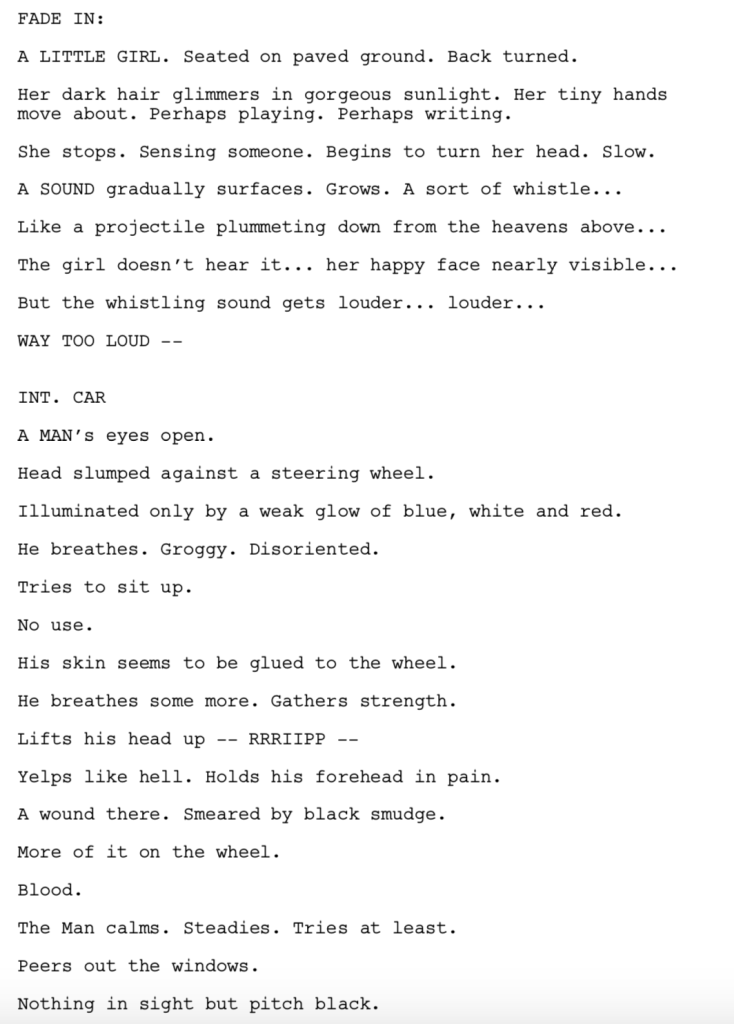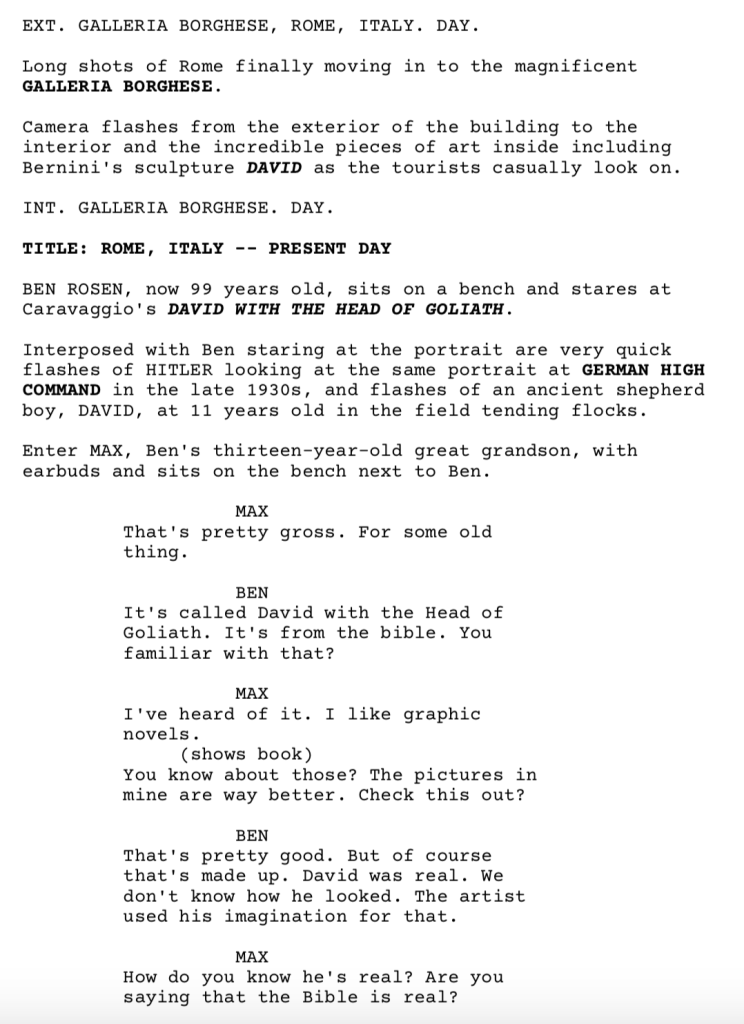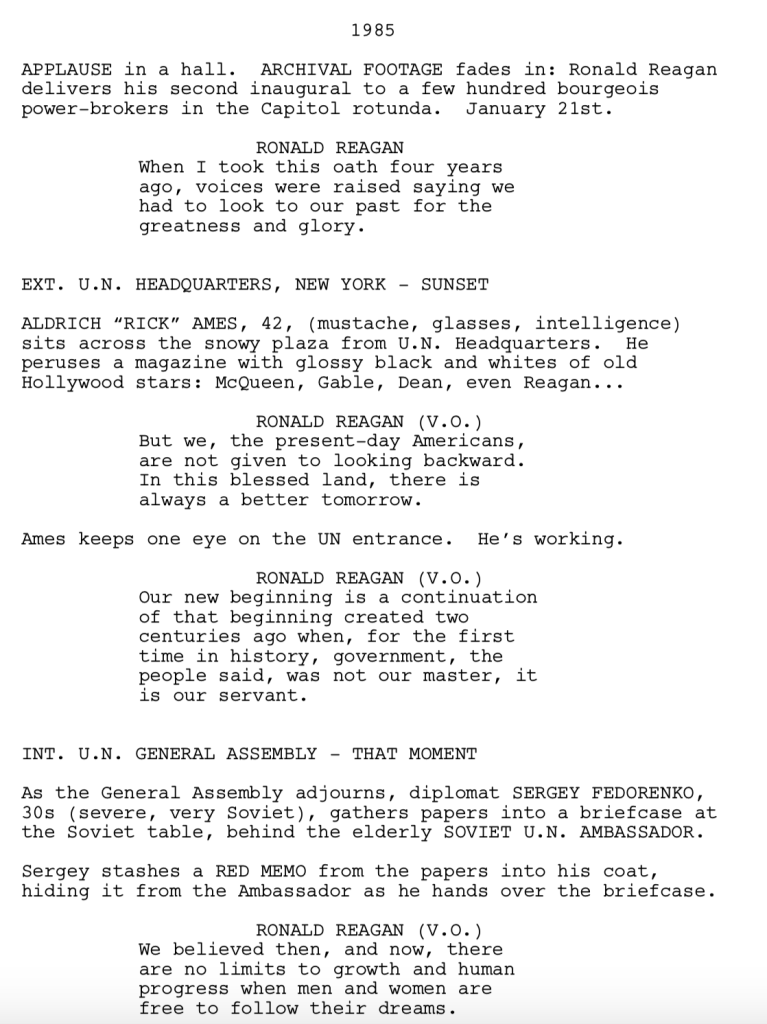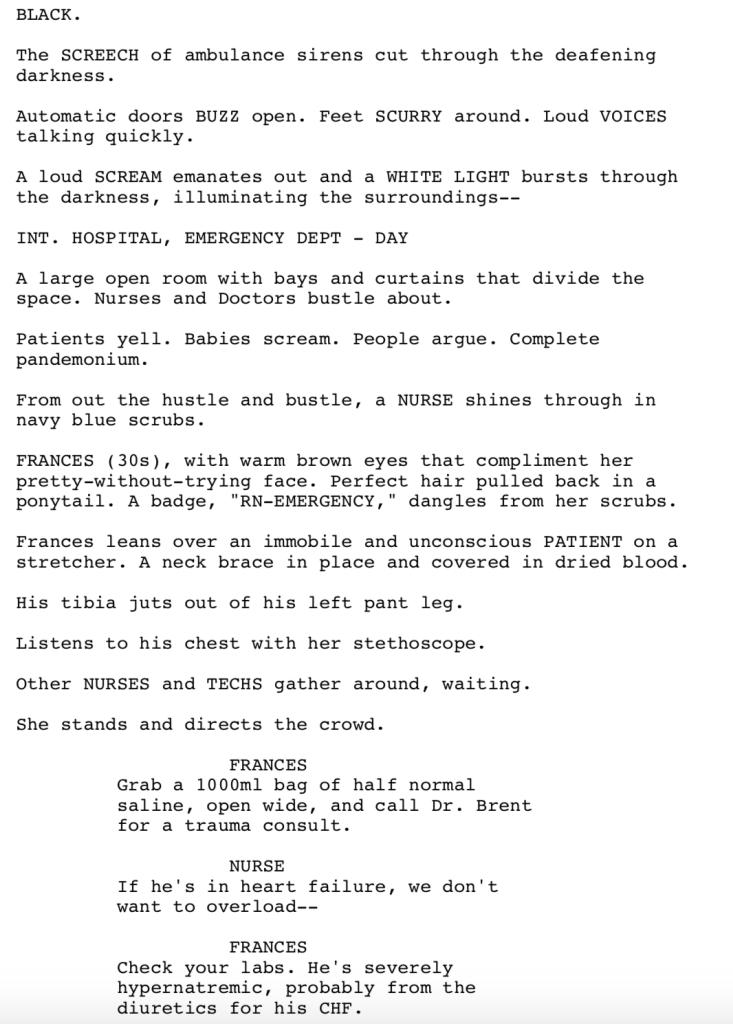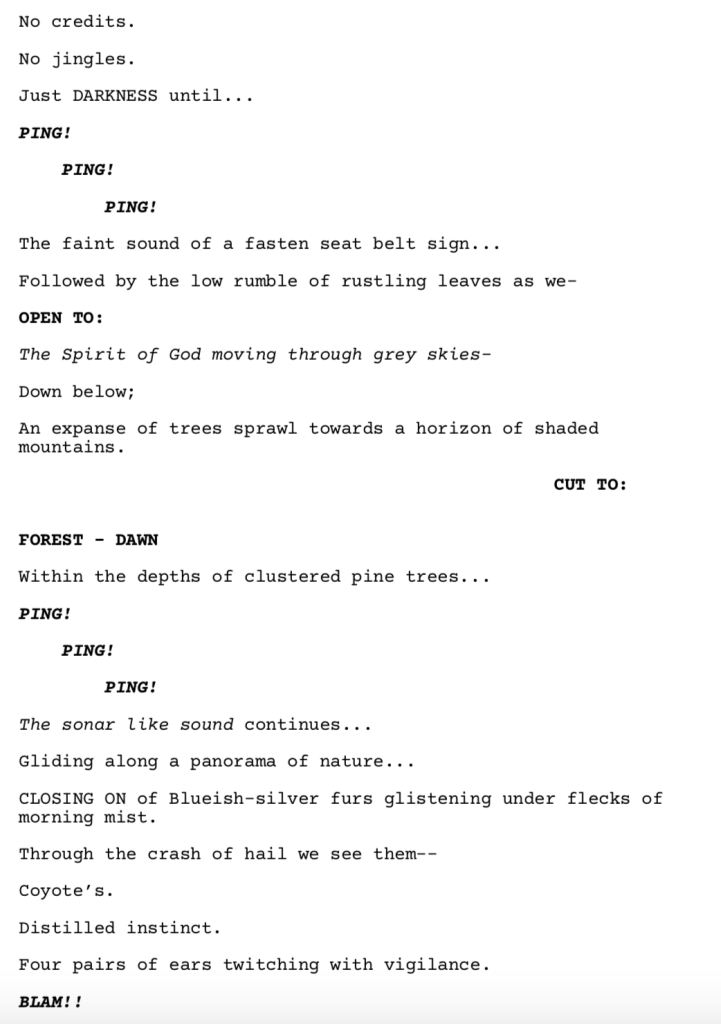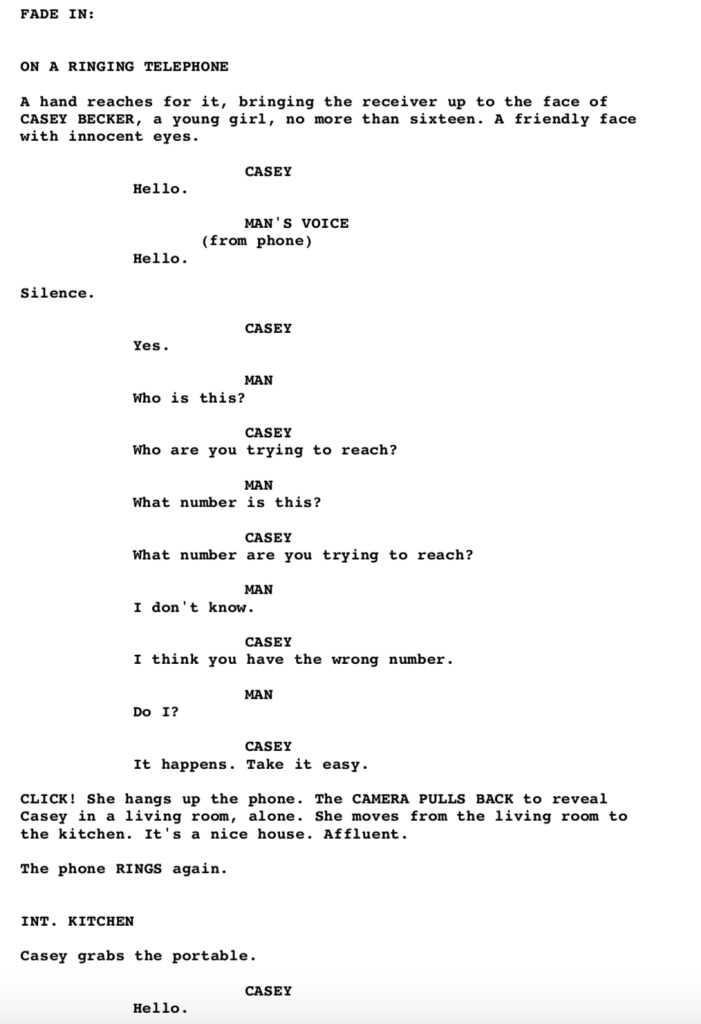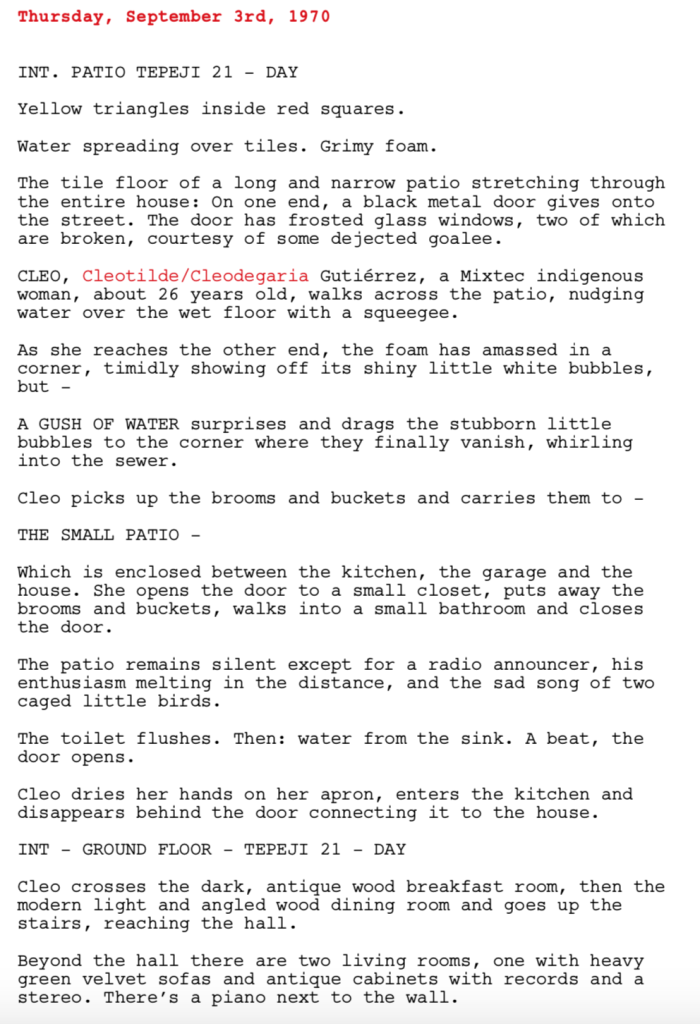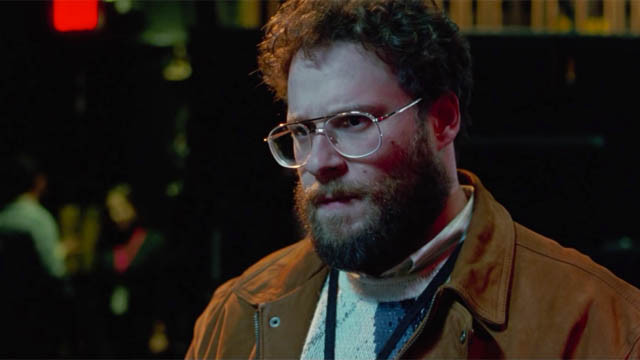Search Results for: F word
Genre: Creature Horror
Premise: Trapped in a mountain resort by a parasitic fungus that transforms its victims into deadly hosts, a timid CDC epidemiologist must learn to lead the group of mismatched survivors to escape this primordial terror.
Why You Should Read: After my last entry on the site, “The Crooked Tree,” was selected for a previous Amateur Showdown, I received invaluable feedback from the readers that I applied to my latest effort, “Genesis,” which explores the consequences of genetically-altering Mother Nature. Drawing inspiration from a slew of 80s classics, my career as a Registered Nurse, and a few real-life scientific oddities, I crafted a unique creature-feature that serves as my love letter to this subgenre. I hope my entry impresses you enough to select it for a coveted spot in this year’s Halloween Showdown!
Writer: Samuel Kerr
Details: 84 pages
Welcome mummies, tarantulas, and ghoulettes.
Carson isn’t in today.
Sorry, not sorry.
Your review will be written by me, Vampire Carson.
Ooh ooh ah ah ahhhhhh!!!!!!!
I know you’ve been waiting all year to suck the blood of the Halloween Amateur Showdown winner. Your moment has arrived. After doing some repairs on my coffin (note to fellow vampires: stay away from the Bedson 1000 – the sunlight blocking is dreadful and customer support is horrid) and retouching my windows with fresh black paint, I made a call to my best friend, Count In-and-Outcula, who promptly door-dashed me their Halloween special: Four double-doubles vampire style – extra rare beef on a plate of nothing.
After wolfing down this most monstrous meal, I poured myself a tall glass of Kevin Who Lived Downstairs, November 2018 (it’s wine-o-clock somewhere, amiright?) and opened my laptopula to read today’s winning entry. I’ve never read a screenplay before so let’s just say I’m dying to see what it’s all about.
Somewhere in the Rocky Mountains, a giant greenhouse is being burned to the ground with scientists inside! That’s because some sort of deadly virus broke out here. Cut to 30 years later where a couple of stoners, Beav and Moss, are poking around the remnants of this place and encounter a mushroom that blows up in a puff of smoke, right in Moss’s face.
Cut to a thousand miles away where Jules, a mycologist (a person who studies fungi) is trying to tame her special needs son. Then David, a field investigator for cases that involve epidemiology, shows up at Jules’s place and says he needs her for a job. Jules is reluctant because these two have a history, but when David’s boss says he’ll pay for Jules’s son’s private school if she goes, she’s all in.
They fly to a mountain resort so remote that helicopter is the only way in or out. The two arrive to meet Martha, the owner of the resort, who’s accompanied by her special needs adult son, Ace. Ace doesn’t like messes. Jules goes up to check on the incapacitated Moss’s infection and it’s not looking good, folks. The guy has a distended stomach that makes him look pregnant.
Meanwhile, David recruits Beav to join him at the scene of the crime. There they find one of the original dead scientists and decide to throw him in a bag and drag him back to the resort. After all that work, it’s time for dinner! While everyone digs into some chicken, Moss comes downstairs, hungry as a horse. After devouring everything he can find, something in his stomach starts moving. Moments later his abdomen bursts and a 2 foot slug slithers out, disappearing into the next room.
Jules is starting to notice something we noticed, oh, about 30 pages ago, which is that all of this feels very unprofessional. When she confronts David, he confesses that this is a private job. Nobody else knows about it but them. Jules is angry but they’ve got bigger slugs to fry. Literally. Cause the next time they see the slug, it’s four feet tall and has a circular face that opens up to reveal a thousand teeth.
Lucky for Jules, Ace is a bit of an engineer, and has managed to cobble together a makeshift flame-thrower. They’re going to need it. Cause Sluggy the Dental Anomaly is downstairs laying more mushrooms than were consumed at last year’s Burning Man. After creeping around the resort all night trying to kill or capture this thing, David’s boss shows up. And he isn’t happy with David. We know that because he shoots him 50 times. Jules and Ace are going to be next unless they can defeat both David… and the Mushroom Slug From Hell.
Guys!
Oh my god, I am SOOOOO sorry. I just got home from lukewarm yoga to find Vampire Carson reading this script. I did not give him permission to do this so I apologize for the inconvenience. You have to understand that October is Vampire Carson’s favorite month so he’s always in party mode. I remember we were hanging out last Halloween and my best friend, Kevin, was over. We had a night to remember. Then the next day Kevin just disappeared. Never wanted to hang out again. He didn’t even text, jerk.
Anyway.
The good news is that Vampire Carson took meticulous notes which will allow me to give you a proper review. I mean check these out (page 1: needs more blood, page 8: needs more blood, page 15: needs more blood, page 37: blood, needs more of it, page 52: lots of blood but not enough description of it). Why would I need to read a script when I’ve got notes like that? Let’s jump into it.
Scripts based on 80s creature features are surprisingly challenging to review. These movies tend to embrace a lack of realism that, when done well, actually enhance the viewing experience. But as scripts, they often seem cliche and unrealistic. Is that the intention or does the script really have problems? Depends on who you talk to.
Well, you’re talking to me. So here’s how I saw it.
There was something too “save the caty” about this story. The way the characters were introduced and the structure used were too common and predictable. We get the scary teaser scene of the greenhouse structure being burned down. We get the save the cat moment with our hero. She’s got a special needs kid to ensure we’ll like her. The opposite sex co-star shows up. They have a romantic history with each other but now don’t like one another.
Don’t get me wrong. I like a solidly structured screenplay, even if it hits all the pre-arranged beats. But when EVERYTHING about the script is familiar, it ceases to function as an original story. Instead, it becomes an homage on steroids.
And this is definitely that. I mean we have an alien creature that gestates inside the human body, spits out, then, over a very fast period of time, grows bigger, more complex, and more dangerous. We also have a female heroine running around with a flamethrower. Does that sound like any movie you’ve seen before?
I don’t want to rain on Sam’s parade because I did like the fungi angle. I’ve never seen that before. But Sam didn’t do anything with it. The mushrooms seemed to be a placeholder to get the alien inside a body, where it then became nothing like a mushroom. It could’ve come from anything. I would’ve spent more time designing a creature that felt like it evolved from mushrooms/fungi. Make this creature your own. When I saw the circular teeth, I thought, “I see that in every movie now. It was just in Men in Black.”
I also had a problem with the blasé approach to the investigation. I know that later we find out why (because this investigation is not official). But even if it isn’t official, you don’t let the guy who was just upstairs, bleeding profusely everywhere on his body and displaying vitals that say he should be dead, to casually come down and join you for dinner. This is a virus, is it not? Yet you’re asking him to pass the chicken?
The thing is, there might still be a movie here. I like the location. I like the unique qualities that a mushroom could have on a creature design. But I would come in here with a real team of scientists. I would cover the investigation much more realistically. And I would spend more time figuring out how an alien that grows out of fungi would look and operate. Cause if you put some real effort into this, it could be cool.
What did you guys think?
Script link: Genesis (new draft)
[ ] What the hell did I just read?
[x] wasn’t for me
[ ] worth the read
[ ] impressive
[ ] genius
What I learned: When you have one of your characters read an e-mail or letter, the audience rarely needs to know the whole thing. In a SCREENPLAY you’re always looking to convey the most amount of information in the least amount of words. So what Sam does here is the smart way to go…
Sorry, Vampire Carson insisted he get his own ‘What I learned.’ So here it is.
What I learned (Vampire Carson): When introducing characters, it is imperative you describe their neck. You can learn so much about a person from their neck. A long neck represents a confident individual. Short and stubby necks denote weak blood flow and therefore people not worth late night party invitations. Pale necks allow one to see veins easier, which is important for…certain people to know. Never overlook the neck.
Just a friendly reminder to anyone submitting a script for Amateur Friday. I recognize that this is a nice opportunity to get feedback for scripts that are works in progress. But I’m letting you know now that any pitch along the lines of, “I’m not really sure about this script. I’m hoping to see what people think” isn’t going to get chosen. This is the only place on the internet where random strangers willingly read amateur screenplays. So I’d prefer to put the best stuff up here I can find. There’s no hard and fast rule to this. If you send one of these e-mails and include a Jurassic Park level logline, then yeah, I might post it. But, generally speaking, I won’t. The scripts that win Amateur Showdown tend to be scripts that the writers have put a ton of work into. So you’re gonna want to bring your best anyway.
Oh, and I have one minor requirement for readers participating in this weekend’s festivities. Before reading any of the scripts, you must first perform The Git Up Challenge. Preferably with the shades up so that your neighbors can see you.
If you haven’t played Amateur Showdown before, it’s a cut throat single weekend screenplay tournament where the scripts have been vetted from a pile of hundreds to be featured here, for your entertainment. It’s up to you to read as much of each script as you can, then vote for your favorite in the comments section. Whoever receives the most votes by Sunday 11:59pm Pacific Time gets a review next Friday. If you’d like to submit your own script to compete in a future Amateur Showdown, send a PDF of your script to carsonreeves3@gmail.com with the title, genre, logline, and why you think your script should get a shot.
Title: The Above
Genre: Contained Thriller
Logline: Awaking on an unknown flight to find everyone else unconscious, a dazed baggage-handler must uncover his foggy past and save the plane before it falls from the sky.
Why You Should Read: Contained thrillers still today seem to remain one of the best ways to sell a spec. One possible issue with them is that they sometimes can feel like they’re stuck in place (which they usually are). Here’s my try at avoiding that issue by using a contained location that’s moving at the speed of hundreds of miles per hour. I went back to see Carson’s reviews on earlier contained material and tried my best to incorporate all the best parts of them, from clear GSU to steadily unfolding mystery. Very interested to hear everyone’s thoughts!
Title: The Final Solution(s)
Genre: Historical Fiction/Science Fiction
Logline: A centenarian recounts to his great grandson how he was secretly recruited as a WWII soldier to be transported to biblical times to counter Hitler’s plot to destroy a fledgling Jewish nation.
Why You Should Read: My day job is as real as it gets; I’m an urban public defender. I employ the persuasive power of words to desperate situations, often for societies’ outcasts. And while I feel generally fulfilled by my calling to serve the voiceless, the law is not my first love. Books and movies occupy that place. Fiction and philosophy are my particular favorites, but I partake in all levels of discourse, from Cable News to Cardi B, Stephen Hawking to Steven Soderbergh, James Fenimore Cooper to Jim Rockford. Currently, I am trying to discover how a late-forties father of two with a second marriage and two more step kids, nagging yoga injuries, an inflated mortgage, a stressful career and all the other normal trappings of middle-class American life can become a Dharma Bum. I doubt I’m the only one seeking that answer, but perhaps I’m the only one framing the question quite like that.
Everything I write at this point in my life strives to highlight the primordial human yearning for peace and love set against the grit and contradictions of our post-everything world. The attached screenplay reflects my personal appreciation for art and science as well as history and fiction. Hopefully it reflects my deepest belief about all art, namely, that art should seek simultaneously to entertain and to educate, to touch both intellectually and emotionally, and, most of all, should serve to nurture each of us to find our best, our most complete selves. If nothing else, this script represents the uniqueness of me, my life experiences and worldview, and in that way will be unlike anything else you have ever read. I can think of no other work in literature or the movies that weaves history, fiction and the bible together in such a cohesive and plausible manner. And yet, in the end, it is the relationship of storyteller to listener, ancient mariner to wedding guest, that forms the emotional center of the work and delivers the simple moral truth that drives this story forward.
Title: YEAR OF THE SPY
Genre: Spy, True Story, Thriller
Logline: In 1985, when CIA Officer Aldrich Ames sells what he believes to be useless intelligence to the Soviets to pay for his divorce, he inadvertently sets off an international Cold War crisis that finds him heading up a special CIA unit — a unit created to find out who sold secrets to the Soviets.
Why you might read: Being true, it’s a spy story that’s more grounded than most, but also barely believable in how it plays out. There are absurdities that could only come from real life. It’s based on research drawn from the Senate Committee report published after Ames’s arrest, as well as testimony from the Soviet Intelligence Officer who ran Ames as an agent. Personally, I could use some writerly interaction with my work as I’ve been more-or-less blocked for the better part of a year, and need to get back into the flow. I’d be very grateful for any and all response to the script. Thanks.
Title: The Crooked Tree
Genre: Horror
Logline: While staying on a rural plantation, a live-in hospice nurse, struggling with the loss of her daughter, must save her young patient from a mysterious intruder.
Why You Should Read: Before becoming a full-time Registered Nurse, I attended film school with a foray in horror screenwriting; my ultimate passion. I’ve always loved the genre and the craft, but, at the time, I felt that I could make a better living as a RN. But that writing itch never left! Over a decade since I wrote my last screenplay, comes The Crooked Tree, a unique combination of home invasion and occult horror. This is a love letter to my two favorite sub-genres and I hope you are willing to give it a chance! To quote recent WeScreenplay coverage, “The Crooked Tree offers a very fresh and horrifying vision that feels unique. A terrifying addition to the genre.”
Title: OFF-GRID
Genre: Thriller.
Pitch: Searching meets Nightcrawler.
Logline: An overprotective ex-cop discovers his daughter’s hidden life as an exam cheat sheet organizer after she goes missing from school.
Why You Should Read: Hey Carson, my name is Sylvester Ada. 2 years ago, you reviewed my pilot script CLUB LAVENDER about the cabaret drag queen caught up in a mob war. It received a worth the read from you and while you loved the writing, calling it one of the best written scripts of the year, you weren’t a fan of some story elements. Here’s my first completed feature. It’s a lean 81 pages with lots of white space, action and just an all round fun read. The perfect candidate for the age of streaming content and most likely going to be one of the most fun scripts you’ve read all year. It also deals with real world tech and grounds it in a fun way.
A month ago, I was in the middle of reading a script and I was bored out of my mind. Whenever I’m bored, I instinctually check what page I’m on. So I looked up at the top of the screen and noted that I was on page: Four. That’s right, page four. How bad does a script have to be for the reader to already be bored by page four? Bad. And yet, this is common. Especially with amateur screenplays.
It occurred to me as this was happening that all screenwriting is is time-buying. You’re trying to buy more time with the reader. If you can promise them that that next page is going to be just as entertaining as this one, they will keep turning the pages. And nowhere is this more important than the first ten pages. Because the first ten are where you hook someone. If you can pull them in immediately and not let go, it acts as a promise – a promise to the reader that “I’m going to entertain you.” Once that trust is established, you have them.
This got me wondering: What if I threatened every writer that THE SECOND I was bored, I would stop reading their script? In other words, if I was bored at the end of the first page, I wouldn’t keep reading. If I was bored at the end of the first paragraph, I wouldn’t keep reading. If I was bored AT THE END OF THE FIRST SENTENCE, I wouldn’t keep reading. Would writers change the way they wrote their first ten pages? Of course they would. Every sentence they wrote, they would ask, “Will this keep the reader reading?” And I suspect that everybody using this strategy would become a markedly better writer in the process.
Now some of you are probably thinking, “This is unrealistic, Carson.” All it would do is result in a bunch of scripts catering to the ADD crowd. The literary equivalent of Michael Bay lining up a series of explosions. But here’s the thing – keeping someone entertained doesn’t mean dropping the reader into a firefight or an argument. It can mean that. But there’s more than one way to lead a horse to water.
Yesterday’s script is a perfect example. Promising Young Woman starts with a group of men leering at a hot drunken woman in a bar. Right away, we know something very bad has the potential of happening. So guess what? We keep reading to find out if it does. It’s a very simple dramatic storytelling device. And it’s ensured we will at least read until the end of this scene. No ADD-catering required.
Contrast this with the opening of Monday’s script. We’re in the aftermath of a giant accident and our hero’s daughter has died. The scene creates a little bit of mystery (“What caused this?”), which creates just enough momentum for me to begrudgingly read on. But as an opening scene, it’s weak. Nothing is happening. There’s no tension. There’s no suspense. There’s no conflict. All of that happened before the scene. All sorts of alarms go off when I see this. If there isn’t a single well-developed story skill in the opening scene, why would I think this writer had the skills to entertain me for the next 100 pages? And guess what? I was right. There were no storytelling skills on display for the rest of the script. The script was boring.
But let’s get back to my idea. What if you knew that the reader would stop reading your script the second they were bored? Would you become a better writer in those first ten pages? Would you focus more on entertaining the reader? I say you would. One of the best examples of this is a script that sold all the way back in 1994. It was the hottest spec of the year. Everyone was talking about it. And it went on to become a hit movie. Here’s the first page of that script…
Is there anyone here who can honestly say, “I was bored, I stopped reading?” A show of hands. That’s right. Not a single hand raised. This first page, from the script for “Scream,” is the embodiment of my philosophy. The script grabs you from the very first sentence, and there’s never a point after that where you can stop reading.
“ON A RINGING TELEPHONE.” Well duh, we have to find out who’s calling. Establish a 16 year old girl. “Innocent eyes.” Why point out she’s innocent? Might she be in danger in the coming lines? “Hello.” “Hello.” Silence. Bam, this conversation is already interesting. The person calling isn’t following normal protocol for a phone call (“Hi, is Jake home?”). They just say, “Hello.” Then silence. “Yes,” she asks. “Who is this?” he replies. Okay, now you really have me. The person who’s calling doesn’t get to say, “Who is this?” That’s the answerer’s duty. What’s going on here? I have to read more.
The conversation continues with the man asking questions he shouldn’t be asking. “What number is this?” Then answering her questions in a creepy way. “What number are you trying to reach?” “I don’t know.” “I think you have the wrong number.” “Do I?” Casey, trying to act above it, hangs up on him. “The phone RINGS again.” Casey answers the phone again. “Hello.” HOW CAN YOU NOT TURN THE PAGE after this? How can you not want to find out what happens next? This is how you write to keep the reader’s attention.
I know. I can already hear you zipping around the internet looking for examples of movies that start slowly. “Roma doesn’t start fast, Carson! Roma was nominated for an Academy Award!”
Come on, you’re smarter than this. Roma isn’t a spec script that needed to win over readers. If you are a writer-director, if your movie’s development is already paid for, if your movie is being fast-tracked, if you’re adapting a book, you do not need to worry about this problem. The irony is that all of these writers would do well to still abide by this philosophy. But they don’t, which is partially why so many of these movies are boring. Don’t forget your unique circumstance. You are a nobody whose only influence on someone is the words you write in this document. You’d be smart to use every one of those words wisely. Hook them and never let them go.
Okay, Carson, you’ve made great points as always. But how do we actually execute this plan? What’s the trick to writing an amazing first ten pages? Unfortunately, there’s no trick. But there are certain setups that work better than others. One of the best things you can do is identify all your favorite movie openings – movies that hooked you right away – Then ask, “How did they do that?”
One thing that we’ve identified that works is to place someone who’s helpless in harm’s way. That worked for us in Promising Young Woman. And it worked in Scream. It doesn’t have to be a woman. It can be a kid. Or, if you create a situation whereby a grown man is helpless in a situation, that might work as well.
Another theme of good early scenes is that we’re dropped into something important happening. We’re not dropped in afterwards (like Absence of Courage). We’re not dropped in five hours before (characters going about their everyday lives). We sense right away that something important is happening and therefore we want to find out what happens next. For example, if you opened on a woman in a boardroom sweating bullets, trying to act like she’s not sweating bullets, and we pull back to see she’s in an intense job interview, getting hammered with hard question after hard question, that could hook a reader.
Conversely, you can hook us in the build-up TO that interview. You could place that same job applicant in the waiting area, sweating bullets, going over her notes, trying to remember everything, eyeing the other applicants sitting nearby, all of whom are better looking and better dressed. If I’m dropped into that moment, I’m going to want to keep reading to see how that woman performs.
You could take that same character, however, and start with her waiting outside school to pick her daughter up, and you’ve lost us. It’s not the most boring thing you could start on. But there’s no importance attached to it. Where’s the suspense? Where’s the “reason to keep reading?”
Then again, with a little finagling, you could turn this scene into an interesting one. Focus on the woman waiting while all the other children come out and meet their parents. And with each passing kid that isn’t hers, there’s a looming sense of dread in our protagonist. She’s craning her neck. Looking at a few groups of girls chatting. Her daughter has to be around here somewhere. All of a sudden, a teacher approaches, a concerned look on her face. “Maggie?” she says to our protagonist. “What are you doing here?” “What do you mean? Where’s Tracy?” “You don’t remember? You called an hour ago. To say her uncle was picking her up.” We can see from Maggie’s eyes that she did not call an hour ago to say Tracy’s uncle was picking her up. And now we have to keep reading.
The real trick here is creating an interesting situation. Don’t plop us into some boring mundane scene. Come up with something that’s got some stakes attached to it. Someone’s in danger. Something’s gone wrong. There’s conflict involved. There’s mystery. Give us something that’s impossible to stop reading. And when you finish that first scene and you still have five pages left in your first 10, don’t rest on your laurels. Give us another scene we can’t stop reading. Hold yourself to the same standards you hold other writers to. You’re bored out of your mind reading other writers’ work. Well, then don’t do the same things they do.
So here’s how this is going to work. We’re having a First 10 Pages Contest. The one rule of this contest is that THE SECOND I’M BORED, I WILL STOP READING YOUR PAGES. If I’m bored in the first paragraph, I will stop reading. I have no problem giving up on your pages 20 seconds into them. Knowing this, will you become a better writer? That’s the experiment here.
I don’t know what the prize will be other than featuring the winners on the site. But I can tell you this. I’m not going to feature bad work. If not a single entry results in me reading the full ten pages, there will be no winner. I’m genuinely curious to see if anybody get can me to read the full ten. Because 99% of the time, I wouldn’t read past the first scene if I didn’t have to. I want you to really internalize that. Writing a screenplay isn’t this giant complicated process of navigating readers and agents and staying updated with trends and blah blah blah. It’s writing a series of words that make the person reading it want to keep reading. If you do that, you will be successful.
Submissions will be due a month from now on Sunday, February 10th, 11:59pm Pacific Time. Send a PDF of those pages to carsonreeves3@gmail.com with the subject line: FIRST TEN PAGES. No logline or synopsis needed. You can include a title page if you want. Up to you. You can send them starting today.
Let’s see who can pull this off. Oh, and one last reminder…
MAKE IT IMPOSSIBLE FOR ME TO STOP READING
Genre: Drama/Thriller
Premise: When a young widow’s son mysteriously disappears in Crater Lake National Park she will have one week to find him before the snowy season begins & buries any trace.
Why You Should Read: Much of my writing has always been complex, so I took this opportunity to write something simple, short, sweet and a quick read. I call it Flightplan in the woods. Mother loses son and will do everything to get him back, but has everything in her way. Singular park location with limited characters, a mysterious level of suspense and intrigue, mixed with the paranormal. As this is my first foray into something this simple, I’d love to hear any feedback the group has and take in any suggestions.
Writer: Treaty
Details: 97 pages
It’s official “Kids Disappearing Weekend!” That’s right. If you’re looking for some entertainment, you can check out the computer screen missing daughter thriller, “Searching,” at your nearby multiplex. Or you can stay home, spend a lot less money, and read Crater Lake!
Today’s screenplay is as simple a movie premise as you’ll get. Son goes missing. Mom must find him. I talk about the importance of simple premises all the time. But when is a movie idea too simple? That’s the factor I’ve always struggled with. Because often I’ll read a script with a simple concept and be bored out of my mind.
I think Crater Lake answered that question for me. A movie is too simple when it’s both simple AND predictable. If we’re 40 pages ahead of the story the whole time, we’re going to be bored. So the trick is, when writing these uber-simple premises, to keep throwing in unexpected plot beats, misdirects, surprises, mysteries – anything that keeps the reader curious.
Crater Lake introduces us to 30-something therapist widow Zoey Hayes. After finishing up a weird session with a patient who believes in parallel worlds, Zoey heads home and starts getting ready for a weekend adventure with her 7 year old autistic son, Sam.
The two are going to national park, Crater Lake, where Sam will get to do his favorite thing in the world, take pictures of birds. The two have a perfect system going, with Sam dictating the majority of the operations and scheduling.
Driving along the highway on the way to the park, Zoey spots something in her rearview mirror and screeches to a stop. We never see what she saw, only Zoey jumping out and chasing after whatever it was. She comes up empty handed, chalks it up to her imagination, and the two complete the drive.
After setting up camp, Sam begins bird-watching, and Zoey walks down to check out a nearby stream. Only a few minutes pass, but when Zoey returns, Sam is gone. Zoey freaks out, running around and asking other campers if they saw her son. Nobody has. Soon she finds a park ranger, and a full-on search party is formed to look for Sam.
Strangely, there isn’t a trace of him anywhere. And when staunch female cop, Sheriff Collins, shows up, she’s not much help. In fact, she’s not even convinced Zoey is telling the truth. Nobody at the park saw her come in with her son. And there’s not a shred of evidence that he was in the spot where she supposedly last saw him.
As a result, Zoey is forced to go out into the park and find her son herself. It’s there where she meets mysterious hermit, Aaron Stevens, who it turns out lost his little girl to the park many years ago. According to Aaron, there are mysterious forces working in this park, and that Sheriff Collins has been covering up disappearances for years. Zoey doesn’t care about any of that. She just wants to find her son. Will she?
I absolutely loved the first half of Crater Lake for the reason I listed above. It was simple, but it kept you guessing. There were these great little mysteries tossed in every 10 pages. One of my favorites was them finding Sam’s camera miles away from where he’d supposedly last been seen coupled with us learning that Zoey had been secretly drinking the whole trip. Might she have been responsible for her son’s disappearance and not known it?
However, little things would pop up here and there that gave the impression the writer hadn’t put 100% into his story. The script was written to make us think they were in some remote park with no one around. However, the second Sam went missing, there were all of a sudden a million campers to talk to. Whether they’re isolated or around people is an important detail to establish in a missing kid script. We shouldn’t be finding out there were all these people around after the fact.
Or one second Zoey has an asthma inhaler and the next second it’s gone. Not just gone but completely irrelevant. She never had a single moment from that point on where she struggled to breathe. So why bring up the inhaler in the first place?
Whenever I see stuff like this, I get worried. Especially in mysteries. Because mysteries are all about intricately plotting a story to have a shocking, but more importantly, satisfying, final reveal. So if the writer is flippant about the small stuff, they’re going to be flippant about the big stuff as well.
Sure enough, the ending didn’t live up to the hype. The story introduces this notion of the park being a supernatural place where people can transfer to parallel worlds. The rules for these parallel worlds were fuzzy at best. There was a vague implication that water was how the worlds connected. And… well, that was all we got. Not to mention we’re learning these rules with, like, ten pages to go.
Naturally, when it came time to explain where Sam was, the fuzziness took over, leading to an unsatisfying ending that was a big let down. And I say that because I was so invested in Sam’s survival. That alone is so hard to do – make a reader care about a fictional person who’s an accumulation of words. So when a writer accomplishes that, yet botches the ending, you’re so mad.
With that said, the script is worth developing. I would ask Treaty to consider a draft without the supernatural stuff. OR. Or you can have the hermit believe in the parallel worlds theory, and tease that as a possibility, but in the end it turns out it’s something he’s using to cope with what he knows, deep down, to be true – that his daughter is dead.
I think the better storyline is beefing up Sheriff Collins. She’s a villain with a huge upside. I saw her as a potential rival to Nurse Ratchet for best female villain of all time. If you could build a scenario by which she’s orchestrating all this to cover her ass, and has been doing so for years, that could be a really satisfying ending.
Oh, and you also HAVE to do more with the lost camera. Lost cameras with full rolls of a film in them are gold mines as far as creating mystery. There should be several weird pictures on there that don’t make sense and only lead to more confusion.
There’s SOMETHING to this script. No doubt about it. But right now it feels like a speed-draft where the writer hasn’t done his due diligence of exploring the full potential of the story.
Script link: Crater Lake
[ ] What the hell did I just read?
[x] wasn’t for me
[ ] worth the read
[ ] impressive
[ ] genius
What I learned: Act like you’re going to give the audience an answer, then make them wait for it. Treaty does a TREMENDOUS job of using this device. It was one of the main reasons I stayed so invested in the story. For example, Zoey informs a young ranger who’s helping her about the hermit, whose daughter also went missing mysteriously. So we watch the ranger look this up. And we see him find the story, and he’s about to read it, and we’re about to find out what really happened with this weird recluse and his daughter and right as we’re about to get our answer… we cut back to Zoey’s pursuit of her son. Noooo! Now we have to keep reading before we can find out the truth about the daughter’s disappearance.
Genre: Period
Premise: The Kennedy assassination told in real-time through the eyes of CBS news anchor Walter Cronkite.
About: Expect this project to shoot for a table at the Oscars next year. The high-ranking 2017 Black List script (Top 15) nabbed Seth Rogen to play Walter Cronkite and David Gordon-Green to direct. The rest of the cast hasn’t been rounded out yet, but there are rumors that Bryan Cranston and the Hulk, Mark Ruffallo, will sign on. The writer, Ben Jacoby, has a couple of small indies to his name, but nabbing a star like Rogen makes this his biggest career achievement yet.
Writer: Ben Jacoby
Details: 108 pages (undated)
Let me start off by saying I love the setup for this script.
I’m a sucker for juxtaposing period pieces with high-speed narratives. There’s something thrilling about turbo-charging a genre that’s traditionally slow as molasses. Don’t ask me where I developed this script kink but dammit if I don’t have it (share your script kinks in the comments section!).
I always say that if you’re going to dip your toes into the period piece waters, you’ve got two choices. Find an unknown great story and tell it. Or find a well-known story and find a fresh angle into it. Going real-time on one of the biggest news stories in history is a boss move.
The opening title card informs us that the following story takes place between 1:15 and 3:02 pm, November 22, 1963.
We meet a 47 year old Walter Cronkite hanging out at the CBS News offices, wondering if he’s going to have a job in a month. The ratings for his nightly news show are bad and his boss, Jim Aubrey, is threatening to replace him with a new show they’re currently shooting called Gilligan’s Island.
As Walter ponders his future, a shocking piece of news comes across the switchboard: “President’s been shot.” Walter and the rest of the newsroom jump into action and begin the excruciating process of trying to figure out what’s happening in a world before cell phones, before cable news, and before, well, anything.
Cronkite awkwardly interrupts As The World Turns to give a hit-and-run announcement that the president was shot. Quickly afterwards he sends the public back to the soap opera. This is how they did it back then. You didn’t stay on the air unless you had real news to report. And since that’s all the info he had, that’s all the info he gave!
Jim Aubrey flies into studio and starts arguing with Cronkite about how to report the story. He wants Cronkite on the air non-stop whereas Cronkite believes they need to do some information-gathering first. There’s a young reporter, Dan Rather, who’s managed to get to the hospital that’s treating Kennedy. If they’re patient, they can report the truth instead of rumor.
Aubrey doesn’t care about all that. He wants Cronkite to be the first to report Kennedy’s death. The intense showdown culminates in a fierce battle that ends with Cronkite on-air, refusing to report the death until it’s officially confirmed, even as the competition around them reports the death, one by one.
I gotta hand it to Jacoby.
Genius idea this concept is.
You take a famous moment in history. You tell that story in a non-traditional way (through a news reporter as opposed to Kennedy himself). You add a real-time component to spice it up. You’ve got the director-porn location of a 60s news station. You’ve got a main character that a bankable actor is going to want to play. You’ve got a budget-friendly setup in that the locations are limited.
I could never write a script like this because I don’t gravitate to the subject matter. But this is the kind of setup that gets a script made into a movie.
So why the hell didn’t I like it??
Let’s start with this this: I couldn’t tell if this was a movie or a documentary. Cause all it does is recount what happened that day. If all you’re going to do is recount, you might as well make a documentary.
The reason you make a movie is because there’s a compelling conflict to explore at the center of the story. For example, if you were to make a movie about the Cuban-Missile crisis, you wouldn’t just report how it happened. You’d zoom in on the fact that if the U.S. doesn’t get Russia to turn around, it may lead to nuclear war.
Where’s the conflict in a guy trying to get a story?
What happens if he fails?
I’m pretty sure the world would still find out that JFK was assassinated.
It seems like the conflict they’re going with is that if Walter Cronkite doesn’t nail this story, he MAY be let go from CBS News. Not WILL be let go. But MAYBE (quick Scriptshadow screenwriting tip: never deal in maybes with movies, always absolutes). But is the consequence of Walter Cronkite losing his job really what we’re worried about in the wake of one of the worst moments in American history?
The other conflict is between Aubrey and Cronkite in regards to whether they should be reporting news before it’s confirmed. This is always a compelling argument when it comes to news and happens to be timely in the wake of today’s media. The problem is that this conflict is late-arriving. It’s almost like the writer figured out, “Oh yeah, THAT’S what my movie’s about,” halfway into the script, then built the remainder of the movie around it.
This happens sometimes. You’re writing a script and it isn’t until well into the process that you understand what your script is about. If that happens, it’s your job to go back and pepper that theme throughout the first half of the story as well. The reader shouldn’t be able to identify the moment an idea struck you.
Despite these issues, I have admiration for this idea and how the writer approached it. Not to mention, I love writers who care about the reader. Every sentence here is an economy of words. There’s a ton of dialogue, which also makes the read fast. Pop this script open and read the first five pages. I guarantee you’ll whip through it in two minutes. That stuff never goes unnoticed by me. I just wish there was some true conflict to make this script pop. Maybe they’ll figure it out in the rewrites.
[ ] What the hell did I just read?
[x] wasn’t for me
[ ] worth the read
[ ] impressive
[ ] genius
What I learned: This is a great way to write a spec that makes the Black List and gets studio interest. Pick a famous moment in history. Something everyone knows about. Then find a slightly different angle to tell the story from. In this case, it was Kennedy’s assassination being told through the real-time exploits of a news reporter. In the number 3 script on the Black List, Keeper of the Diary, it was about Anne Frank’s experience, but told through her father trying to get her diary published. The famousness of the moment catches an audience’s interest, and the unique angle intrigues them enough to check it out.




